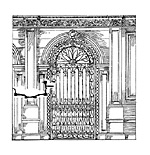
Candles & Candlemas
REMINDERS OF OUR LORD
Candles are a bit like angels: The secular world seems to have acquired a taste for them as the Church seems to be going in the opposite direction. Admittedly, the analogy limps: Candles haven’t been eclipsed in churches the way talk of angels (good and, especially, bad) has.
Think of the proliferation of candles in homes, both scented (perhaps another reminder that people like “smells and bells”) and unscented. They’re clearly not utilitarian: electrification has triumphed, and even if Thomas Edison’s incandescent invention has been banned in the name of “climate change,” there’s something about the light of a candle that your energy-efficient light-emitting diode can’t replicate. (I profess no awareness of whether your candle might someday be confiscated due to its carbon-emitting wick-print.)
Yes, people are attracted by candles. There’s a reason why liturgies such as Tenebrae and the Service of Light at the start of the Easter Vigil make deep impressions on us. But there is a utilitarian aspect to candles as well, which many Catholics have forgotten, one deserving attention as the Church celebrates the Feast of the Presentation of the Lord on February 2.
Once upon a time, Catholics showed up at church on that day because it was Candlemas, when the priest blessed candles. (He still does.) Catholics brought those blessed candles home as sacramentals, and they were common features in their homes, along with pictures of the Sacred Heart and Our Lady, a crucifix behind which palms were kept from one Lent to another, and holy water.
You May Also Enjoy
A writer wants Cardinal Sarah fired from his post as prefect of the Congregation for Divine Worship because he "does not speak for the mainstream of the church."
What could be more Bible-based than the Mass, already saturated with Scripture, following a liturgical year of readings that corresponds to the life of Jesus?
The word "church" has been replaced with less religious-sounding terms, like worship center, family center, family life center, praise center, or outreach center.

